Chickens need to be tested for worms regularly. If there is a build up of worms in their digestive system that can cause health problems. Keeping chickens in a fixed area as so many of us do, where they are grazing the same piece of ground continually is the worst case scenario as they will be contaminating the ground and picking up worm eggs as they are feeding. Infected hens shed thousands of eggs in their faeces onto the ground and so, the problem gets worse.
How can you tell if they need worming? By using a Worm Count Kit! Using a kit means you’re not worming chickens unnecessarily.
Wormers
I use a product containing Flubendazole when necessary to worm my chickens. This is a proven chemical wormer that kill all common worms and their eggs in the chicken and is the only product licensed for use in chickens feed. In between these times, I use Verm-X which has approval for use in Organic systems – now this is a herbal product which works in a different way – you will need to feed this to your hens every month for it to work. The really great thing about Verm-X is that being herbal, it contains many ingredients that are good for your birds so it can improve their overall health.
Good Husbandry
Practising good husbandry techniques is key, in between worming chickens. We try to rotate our birds grazing area every month so that they get some fresh grass but so the ground also gets to rest (this is one of the major principles in Organic farming) and we keep the grass mowed short which allows the ultra-violet light from the sun to reach droppings and kill off worm eggs.
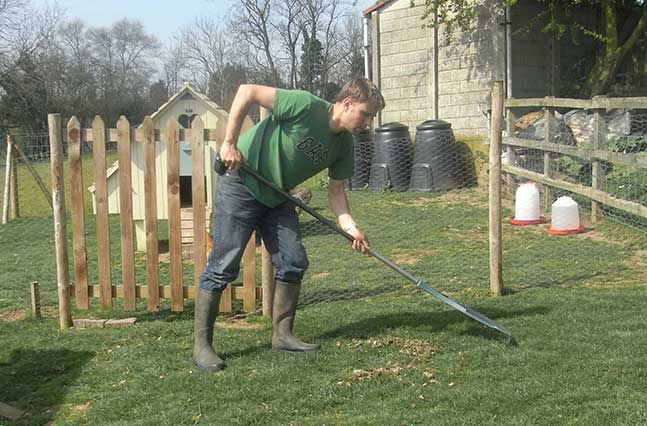
Cleaning a chicken run by raking droppings during dry weather.
General cleanliness is of course important so if your chickens scratch around in their own droppings, you should be thinking about cleaning them up, rather than hitting them with a regular dose of chemicals.
Bad Infestations
If you have a bad infestation of worms, you do need to keep in mind that eggs deposited on the ground will re-infect your birds and it is necessary to repeat the treatment before the eggs hatch and grow into adult worms to lay more eggs. This takes 3 weeks for most common worms carried by chickens so I would re-treat after 3 weeks if I suspect a particularly bad case of worms.
Where external parasites are found on the bird (such as Northern fowl mite or lice) a systemic wormer / pour on product containing Ivermectin is useful. This kills a more limited range of worms. Victoria Roberts Diseases’s of Free Range Poultry says it excludes tapeworm and fluke, but these are less common in chickens. It isn’t licence for use on poultry so you would need to go to your vet for their advice.
Please remember this should not replace the advice of a qualified veterinarian who can advise you about worming.
Do you have any advice on worming? Please leave me a comment below.

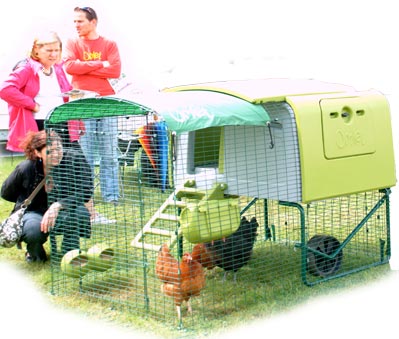

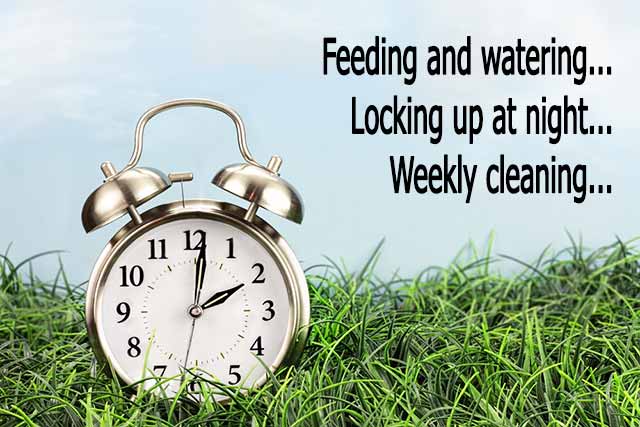
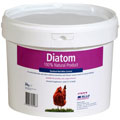
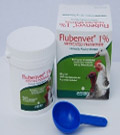
Do you use Flubenvet even when you can’t see evidence of worms, just to be on the safe side? And can you eat the eggs during the period that they are being treated with Flubenvet? Thanks!
Most worms and eggs cannot be seen by the naked eye. Ideally, you would get your vet to send off an egg count on a sample – and then the result would tell you if you needed to worm, however the cost of this means that most of us simply worm routinely every 6 months (or 3 months if kept in a small area or on ground that has had chickens on it for some time).
Yes, if Flubenvet is given according to the label, there is no egg withdrawal period.
I have 2 Ginger nut Rangers and I have purchased Flubenvet but it doesn’t state the dosage to give 2 chickens and the amount of feed to mix with
It should tell you how much to mix with a certain weight of pelleted feed. Basically you feed them for 7 days with this and discard the rest.
Is it safe to eat the eggs when they have worms? What website to buy the dewormer
Normally, yes – but it is possible for worms to get into eggs so check them over.
The website depends on where you are in the World… It looks like you’re in the U.S – I don’t know about the US sorry.
Hiya I’ve just brought some new chickens and they were wormed approximately six weeks ago. My old chickens need worming. Can I worm the new one too and do them all together?
Yes, it shouldn’t hurt them. Another option is to purchase a worm testing kit and see whether they need worming.
Is the Flubenvet Layers Pellets strong enough to kill off/ hold off Gapeworm?
I believe so yes. It’s tapeworm that needs an extra dose and the advice of a vet really.